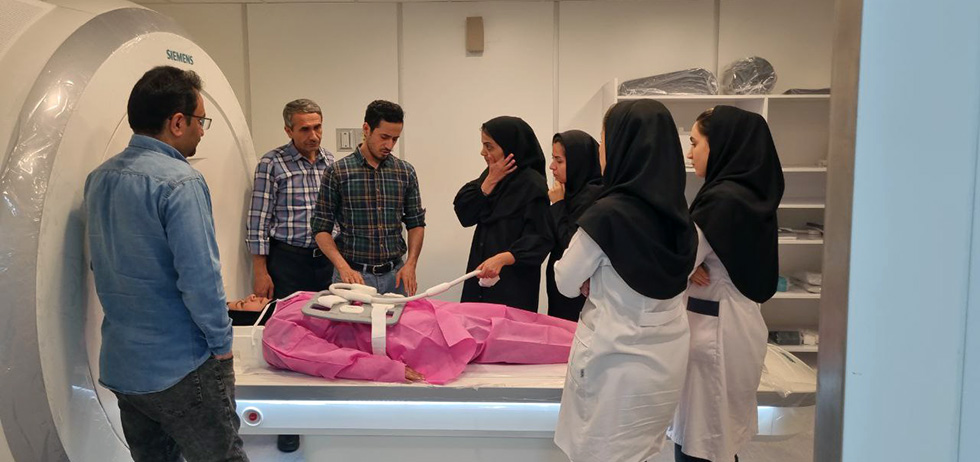 The staff of the hospitals receiving the imaging machines receive training on the use of the machines. Photo credit: WHO/WHO Iran
The staff of the hospitals receiving the imaging machines receive training on the use of the machines. Photo credit: WHO/WHO Iran
6 November 2023, Tehran, Islamic Republic of Iran – WHO, in collaboration with the World Bank and the Iranian Ministry of Health and Medical Education, is spearheading a transformative initiative to enhance access to health care in the Islamic Republic of Iran. Under the Iran COVID-19 Emergency Response Project – Additional Financing (ICERP-AF), WHO is overseeing the deployment of cutting edge medical imaging equipment to 65 public hospitals across 31 provinces.
As part of this effort, 42 magnetic resonance imaging (MRI) machines, 15 computed tomography (CT) scanners and 14 angiography systems are being supplied to hospitals – marking a major milestone in the ongoing battle against COVID-19. This initiative is designed to strengthen the nation’s health infrastructure and cater to the surging demand for diagnostic and therapeutic services.
WHO, in collaboration with the Economic Coordination Center of the Ministry of Health and Medical Education, has successfully delivered 27 MRI machines to designated facilities as of 31 October 2023. A further 814 devices will be supplied to 165 laboratories nationwide, reflecting WHO’s commitment to bolster health care capabilities across the country.
Notably, WHO is carefully monitoring the installation, training and handover processes for the equipment to ensure that these adhere to the highest standards. To date, the handover process has been completed for 9 MRI machines, which are now poised to serve patients. Training and handover processes are under way for 5 more devices.
The project also includes the delivery of advanced CT scanners. Two 256-slice CT scanners have been delivered, one to a hospital in Tehran, the other to a hospital in Mashhad. One of the machines has already been handed over and is ready for use. Ten 128-slice CT scanners have also been imported to the country, with installation, training and handover complete for 6 of the machines. Training is currently under way for the other 4 devices.
The initiative also addresses the urgent need for angiography machines. Six angiography devices have been imported and are currently in the process of delivery to recipient hospitals. Once in place, these will further expand the health system’s diagnostic capabilities.
Equipment was selected based on a comprehensive assessment that considered the increased demand for diagnostic devices during the COVID-19 emergency, the depreciation of existing equipment, and the complexities associated with COVID-19-¬related diseases. The chosen hospitals are primarily in urban areas and hence are strategically positioned to serve a broad network of patients within a nationwide health care referral system.
Distribution of medical equipment to designated hospitals was prioritized based on post-COVID-19 emergency needs, with a focus on deprived provinces, as well as the availability of specialized staff with expertise to operate the complex equipment.
This groundbreaking initiative underscores the commitment of WHO, in collaboration with the World Bank and the Iranian government, to fortify the country’s health infrastructure and ensure that all its people can access advanced diagnostic and therapeutic services. It represents a significant step in the ongoing battle against COVID-19 and in preparing for future health challenges.




